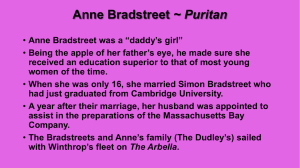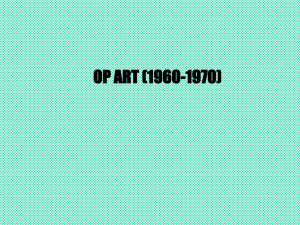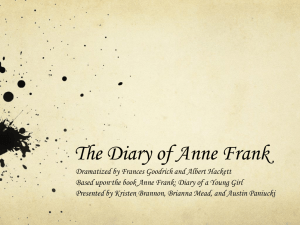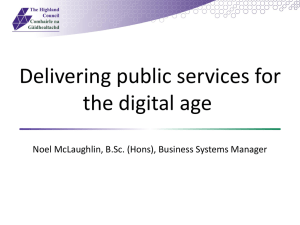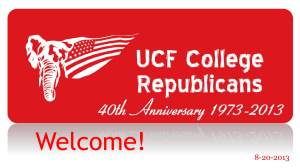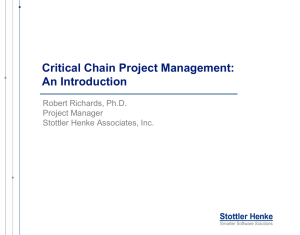Utilising therapy services to improve discharge planning
advertisement
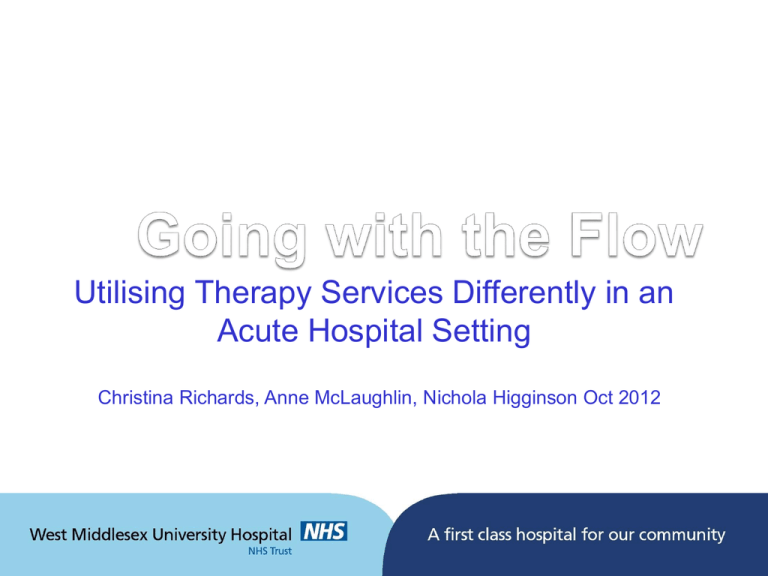
Utilising Therapy Services Differently in an Acute Hospital Setting Christina Richards, Anne McLaughlin, Nichola Higginson Oct 2012 Aims • To give an overview of how we have implemented changes in therapy referral and delivery in an acute hospital within current budget • To feedback the perceived staff and patient benefits from the first three months of implementation • To discuss the ongoing and further development of the initiative Christina Richards, Anne McLaughlin, Nichola Higginson Oct 2012 Introduction • • • • • Background Issues identified Implementing changes Progress Challenges for therapists • Points for discussion Christina Richards, Anne McLaughlin, Nichola Higginson Oct 2012 Background • Recent change in management structure within therapies • Assurance visit from ECIST May 2012 • Withdrawal of ICRT from acute medical unit (AMU) Christina Richards, Anne McLaughlin, Nichola Higginson Oct 2012 Issues Identified • • • • • Continued use of escalation beds The “Lost Tribe of Elderly” Current working practice of therapists AMU referral driven therapy input The impact of the change in how community services are commissioned Christina Richards, Anne McLaughlin, Nichola Higginson Oct 2012 Implementing Changes Change Process:• Therapies workshop for Occupational Therapist’s (OTs) and Physio’s-June 2012 • Four workstreams identified, one of which was tasked to look at referral process and working in speciality teams rather than ward based teams Christina Richards, Anne McLaughlin, Nichola Higginson Oct 2012 Implementing Changes What we did:• Older Adults Therapy team started to case find patients in AMU from July 2012 • Other therapy teams started to work in specialty rather than ward based • The team carrying out the initial assessment followed the patient throughout their hospital stay Christina Richards, Anne McLaughlin, Nichola Higginson Oct 2012 Progress Perceived Patient Benefits:• Continuity of therapy provision throughout their hospital stay • Prevention of institutionalisation and deterioration in function whilst in hospital as patients have therapy plans from the point of admission • Reduction in duplication of therapy assessments • Therapy discharge is planned from the point of admission rather than on referral Christina Richards, Anne McLaughlin,N ichola Higginson Oct 2012 Progress Benefits to Staff:• • • • • Increased job satisfaction Feeling valued Decreased stress Caseload continuity Raised therapy profile Christina Richards, Anne McLaughlin,N ichola Higginson Oct 2012 Progress • What made it work:• Good cross professional working relationships • Good skill mix • Staff engagement • Management support Christina Richards, Anne McLaughlin, Nichola Higginson Oct 2012 Progress Where are we going from here? • Links with local university to ensure robust data collection • Establishing further multi-disciplinary working including specialist nurse and AMU consultant with special interest in older adults • Trialling a 6 day working pattern for OT’s and weekend assistant list Christina Richards, Anne McLaughlin, Nichola Higginson Oct 2012 Challenges to therapists • • • • Staff morale Threat of generic working Changes to healthcare provision Understanding the risks to the profession if change is not embraced Christina Richards, Anne McLaughlin, Nichola Higginson Oct 2012 Points for Discussion • How do you develop flexible and supportive cross professional working? • How do you engage therapy staff in organisational change? • How and when do therapists engage in the discharge planning process? Christina Richards, Anne McLaughlin, Nichola Higginson Oct 2012 Christina Richards, Anne McLaughlin, Nichola Higginson Oct 2012 Contact Details • Christina Richards- Head of Therapies, West Middlesex UniversityHospital Christina.Richards@wmuh.nhs.uk • Anne Mclaughlin-Older Adults Therapy Service Lead Anne.Mclaughlin@wmuh.nhs.uk • Nikki Higginson- Senior OT, Older Adults Therapy Service Nichola.Higginson@wmuh.nhs.uk
